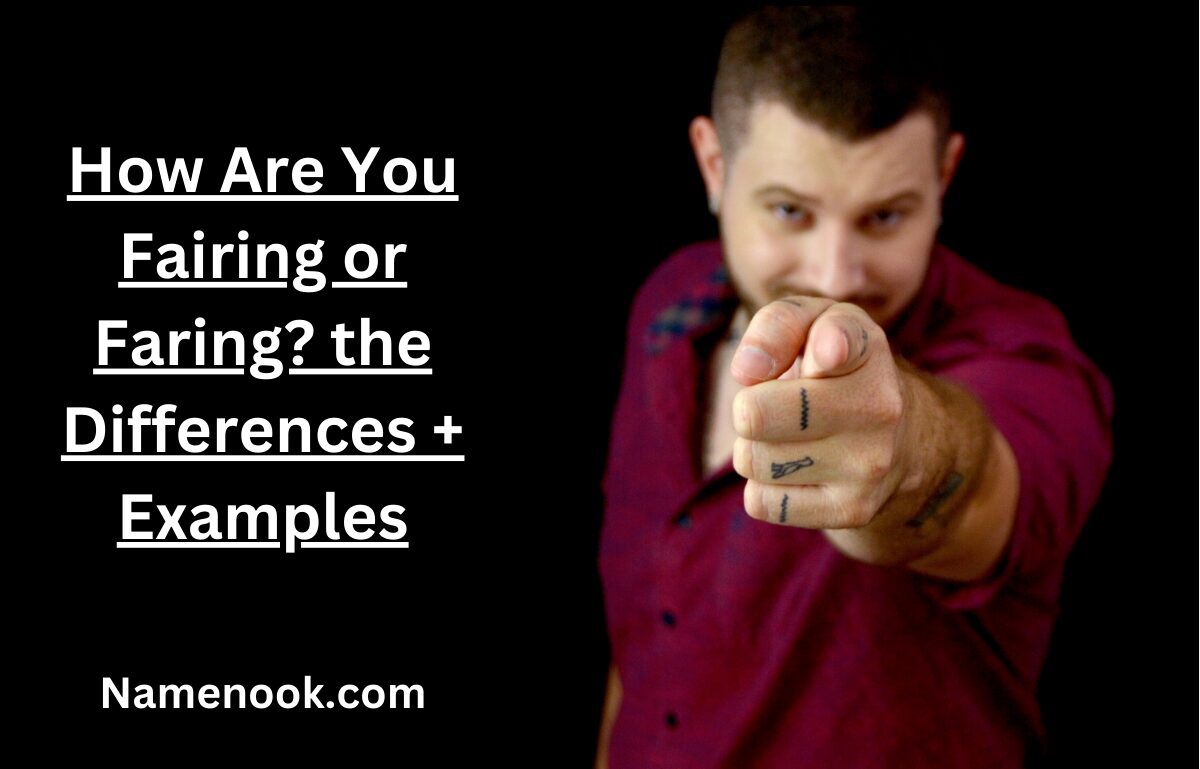“Faring” vs. “Fairing”: What’s the Difference?
In English, a few words sound alike but mean entirely different things—“faring” and “fairing” are great examples. Though they may be pronounced similarly, using the wrong one can completely change the meaning of your sentence.
Knowing the difference isn’t just about grammar—it’s about making sure your message is clear and accurate. In this guide, we’ll break down the meanings of both terms, show you how to use them correctly, and help you avoid common mistakes.
What Does “Fairing” Mean?
Fairing is a noun mostly used in technical fields like engineering and transportation. It refers to a structure added to a vehicle—such as a car, airplane, or boat—to improve its aerodynamics by reducing drag.
Think of fairings as smooth, curved covers that help vehicles move more efficiently through air or water.
Examples:
-
In aerospace: “The rocket’s fairing protects its payload and minimizes air resistance during launch.”
-
In automotive design: “High-performance motorcycles often have fairings to reduce wind resistance.”
In everyday life, though, “fairing” isn’t a word you’ll hear often—unless someone’s talking about mechanics or design.
What Does “Faring” Mean?
On the other hand, faring is the present participle of the verb fare, which means to get along, succeed, or progress in a particular situation. When you ask someone, “How are you faring?”, you’re checking in on how they’re doing—emotionally, physically, or situationally.
Examples:
-
In conversation: “How are you faring in your new job?”
-
After a health issue: “I heard about your surgery. How are you faring now?”
This form is much more common in day-to-day speech, especially in warm or caring conversations.
Common Mistake: Mixing Them Up
Because these words sound similar, it’s easy to confuse them. But using one in place of the other can lead to awkward or unclear sentences.
Wrong: “How are you fairing in your studies?”
Right: “How are you faring in your studies?”
Easy Ways to Remember the Difference
-
Faring = Faring well – Think of it as asking how someone is doing.
-
Fairing = Flight and design – If the topic involves vehicles or engineering, you probably mean “fairing.”
The Bottom Line
Use “faring” when talking about someone’s well-being or progress.
Use “fairing” when referring to structures that improve a vehicle’s aerodynamics.
Example:
-
You: “Hey, how are you faring after your recent move?”
-
Friend: “I’m settling in pretty well, thanks!”
By understanding the distinction between these two terms, you’ll avoid confusion and communicate more effectively.
Why “Faring” Is the Right Choice
When you use “faring” in conversation—especially when checking on someone’s well-being—it shows that you’re not only thoughtful but also have a strong grasp of language. A small word choice like this can have a big impact on how your message is received.
“Fairing” vs. “Faring” – What’s the Difference?
-
“How are you fairing?”
This is incorrect when asking about someone’s condition or progress.
It’s only appropriate when referring to aerodynamic structures in fields like engineering or design. -
“How are you faring?”
This is the correct phrase to use when checking in on someone’s well-being or how they’re managing something.
Real-Life Examples in Context
Professional Setting:
Manager: “How are you faring with the new client project?”
→ This asks about progress and performance at work.
Personal Check-In:
Relative: “How are you faring after your surgery?”
→ A caring way to ask about someone’s recovery.
Why Tone Matters
Choosing the right word doesn’t just make your grammar accurate—it shapes how your message feels. Using “faring” instead of “fairing” adds a more sincere, empathetic tone to your questions.
Everyday Examples
In School:
Teacher: “How are you faring in your classes this semester?”
→ Shows support for academic progress.
Among Friends:
Friend: “You picked up a new hobby—how are you faring with it?”
→ A casual and friendly check-in.
Better Conversations Start With the Right Words
These examples show that using the right term helps build connection and avoids confusion. It’s a small detail that can make your communication feel more thoughtful and meaningful.
More Situations Where “Faring” Applies
In Job Interviews:
Interviewer: “How are you faring with the interview process?”
At Home:
Parent: “How are you faring with your new responsibilities?”
These show how “faring” fits into different types of conversations—whether formal or personal.
Side-by-Side Comparison
| Phrase | Usage | Example |
|---|---|---|
| How are you fairing? | Incorrect for well-being | ✘ “How are you fairing in your studies?” |
| How are you faring? | Correct for well-being | ✔ “How are you faring in your new job?” |
| Fairing (engineering) | Aerodynamic/structural context | ✔ “The fairing on the aircraft reduces drag.” |
Why It Matters
Mixing up “fairing” and “faring” can cause confusion or make you sound less clear or polished. Getting it right not only strengthens your communication but also builds credibility.
Quick Breakdown
-
Fairing:
Technical term used in engineering, often related to vehicles and design. -
Faring:
Everyday term used to ask about how someone is doing or coping.
How to Master It
Here are a few tips to use these terms confidently:
-
Know the Context: Are you talking about someone’s progress or a technical structure?
-
Choose the Right Word: Go with “faring” for well-being and “fairing” for aerodynamics.
-
Practice in Conversations: The more you use them correctly, the more natural it becomes.
Conversation Examples
At Work:
Colleague: “How are you faring with your deadlines?”
Among Friends:
Friend: “How are you faring after the move?”
Both examples show natural, caring ways to check in using the correct word.
Why “Faring” Is the Right Word to Use
Using the word “faring” correctly not only shows that you understand the language well, but it also makes your questions sound more thoughtful and caring. The way we use language can impact how others perceive our sincerity—and this is a great example of that.
Everyday Situations Where These Terms Come Up
Let’s look at some real-life scenarios to see how “faring” and “fairing” are used:
In School:
Teacher: “How are you faring in your classes this semester?”
This shows the teacher genuinely cares about the student’s progress.
Among Friends:
Friend: “I heard you started a new hobby. How are you faring with it?”
This is a warm, friendly way to check on someone’s experience.
Communication That Connects
Using the right word helps your message land the way you intend it. When you use “faring” appropriately, your communication becomes more clear, accurate, and personal.
Understanding Subtle Differences: Examples in Context
In a Job Interview:
Interviewer: “How are you faring with the interview process?”
They’re checking in on how you’re handling the experience—not talking about aerodynamics.
In Family Conversations:
Parent: “How are you faring with your new responsibilities at home?”
This shows care and support in a personal context.
Why Context Is Everything
When choosing between “faring” and “fairing,” context is key. Here’s a quick comparison to make it simple:
| Phrase | When to Use It | Example |
|---|---|---|
| How are you fairing? | ❌ Wrong for well-being | “How are you fairing in your studies?” |
| How are you faring? | ✅ Correct for well-being | “How are you faring in your new job?” |
| Fairing (engineering) | ✔ Technical use | “The fairing on the aircraft reduces drag.” |
What’s at Stake?
Mixing up these words might seem minor, but it can lead to confusion and even affect how sincere or articulate you come across. Getting it right builds clarity and confidence.
Breaking Down the Terms
-
Fairing – A technical term related to aerodynamics or vehicle design, usually used in engineering conversations.
-
Faring – Relates to someone’s condition, performance, or well-being. Commonly used in everyday, social, or professional interactions.
Why It Matters
The right word choice helps you:
-
Communicate clearly
-
Sound more genuine
-
Build stronger relationships
-
Avoid awkward misunderstandings
Quick Guidelines for Using “Faring” Correctly
-
Check the context: Are you talking about well-being or a vehicle part?
-
Pick the right word: Use “faring” when talking about people and how they’re doing.
-
Practice using both: The more you use them correctly, the more natural it feels.
Sample Conversations
At Work:
Colleague: “How are you faring with those deadlines?”
Shows concern about workload and stress.
With a Friend:
Friend: “After the move, how are you faring?”
A personal, caring check-in.
20 Quick Tips for Using “How Are You Faring?”
-
Always consider the context.
-
Use “faring” to ask about well-being or performance.
-
Avoid “fairing” unless you’re discussing technical design.
-
Reserve “fairing” for vehicles, aircraft, and structures.
-
Consider cultural sensitivity when asking personal questions.
-
Clear wording avoids confusion.
-
Don’t assume others know the difference—explain if needed.
-
Show empathy when checking in.
-
Proper usage boosts your credibility.
-
Don’t hesitate to ask questions if unsure.
-
Practice in conversation to improve.
-
Look at the surrounding words for context clues.
-
Stay open to learning as language evolves.
-
Reflect on your own experiences with the term.
-
Use examples to make your meaning clear.
-
Be mindful of your tone—it matters.
-
Don’t overthink it—just speak with intention.
-
Learn from mistakes and keep improving.
-
Encourage honest conversations using “faring.”
-
Celebrate your progress as you get more confident with words.
Final Thoughts
To sum it up: “How are you faring?” is the correct, caring way to check on someone’s well-being. While “faring” and “fairing” sound alike, they have very different meanings—and knowing the difference helps you communicate better.
The next time you ask how someone’s doing, you’ll know exactly which word to use—and you’ll sound thoughtful, articulate, and sincere in the process.

